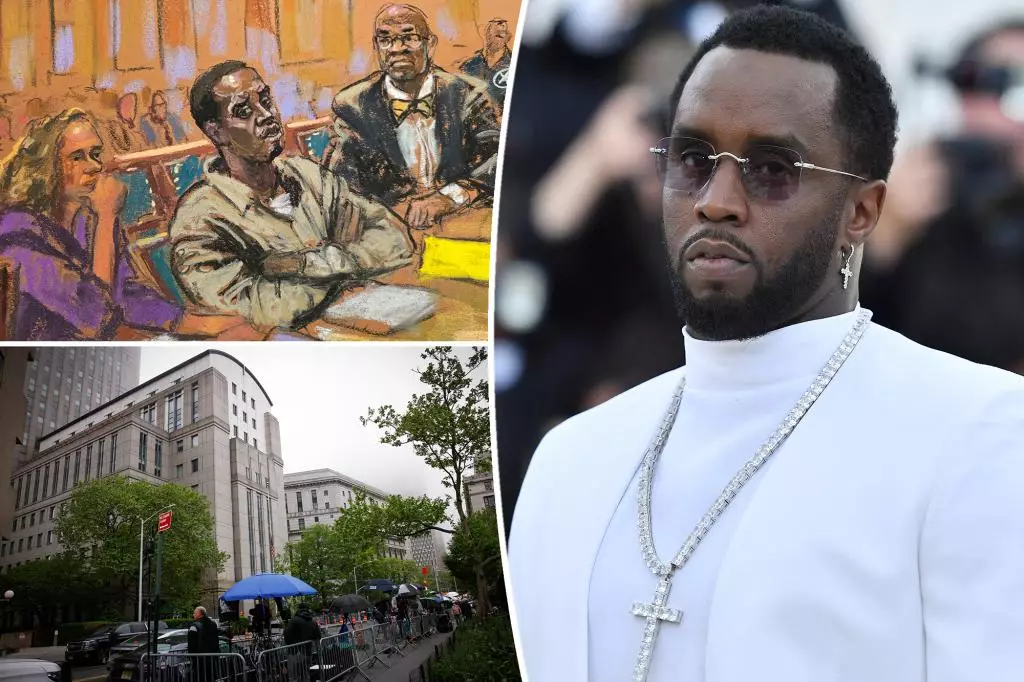In the world of celebrity, the allure often masks the underlying darkness of personal struggles and misconduct. Sean “Diddy” Combs, a figure pivotal in shaping the modern landscape of hip-hop and business, is now standing at the precipice of his darkest chapter yet. As he prepares to face serious allegations of sexual abuse and racketeering, we are forced to confront a multifaceted narrative that blurs the lines between influence, consent, and coercive power dynamics. This legal battle will not only define his legacy but also shed light on the murky truths that accompany fame.
The upcoming trial of Combs is expected to engage a jury for several weeks, rooted deeply in a 17-page indictment that characterizes him akin to a crime boss. It alleges a two-decade-long pattern of predatory behavior against women, orchestrated through manipulation and violence. The alleged “Freak Offs,” which involved drug-fueled sexual escapades, are a stark reminder of how power can transform personal interactions into transactional relationships where consent is clouded by fear and intimidation.
The Stranglehold of Influence
What is particularly troubling in this saga is the manipulation that purportedly took place under the guise of career advancement. Combs is accused of leveraging his vast resources and influence to entice women into compliance, often dangling the promise of stardom while simultaneously holding the threat of career ruin. The juxtaposition of ambition and exploitation raises critical questions about the price of entry into the entertainment industry for women. How many voices have been silenced in the pursuit of dreams? How many lives have been irreparably altered in the quest for success?
The prosecution paints Combs not only as a celebrity but as an architect of an abusive empire. The allegations of violence—beatings, intimidation, and even kidnapping—provide a chilling context for understanding the potential psychological impact on the women entangled in his sphere. The notion that such actions could occur amidst glamour and glitz subverts the narrative of success typically celebrated in pop culture.
The Dance of Consent
As the case unfolds, the question of consent looms large. Combs’s defense presents a contrasting narrative, claiming all interactions were consensual. This assertion opens a profound dialogue on the nuances of consent in relationships marred by power disparities. Are we to view consent purely as a binary decision, or do we delve into the circumstances that surround these choices? The scars of past trauma and the complexities of personal relationships bleed into this conversation, making it challenging to delineate where free will ends and manipulation begins.
In addressing the accusations, Combs and his legal team acknowledge the indiscretions of his past relationships while maintaining that all sexual activities were consensual. His attorney’s admission of Combs not being “a perfect person” speaks volumes—a recognition of the flawed humanity within the façade of celebrity. But admitting to imperfection does not absolve one of responsibility, particularly when the stakes involve matters of consent and integrity.
Enduring Legacy Amidst Legal Turbulence
The past few decades have not been kind to Combs, marred by a series of legal troubles that echo the allegations currently haunting him. From incidents involving physical violence to chaotic nightclub contexts, these episodes reflect a troubling pattern. The historical context is vital, suggesting that this trial is not merely about the accusations presented but about a continuous cycle of conduct that seemed to evade accountability for far too long.
The juxtaposition of Diddy’s illustrious career against a backdrop of severe allegations prompts us to reflect on the broader implications for the music industry and beyond. Can we disentangle talent from behavior? Should we celebrate the contributions of individuals whose personal lives reflect darkness? These questions will continue to nag at society, particularly as the trial promises to expose uncomfortable truths about the intersection of fame, power, and abuse—a spotlight on the vulnerabilities that lurk behind the glimmer of the entertainment sphere.
As the trial approaches, both Combs and his accusers brace for a transformation of narratives. In this unfolding drama lies a salient opportunity for cultural introspection and acknowledgment of the realities faced by countless individuals in precarious positions. Regardless of the trial’s outcome, the questions it raises carry the potential to redefine how we view celebrity culture and the responsibility that comes with it.
